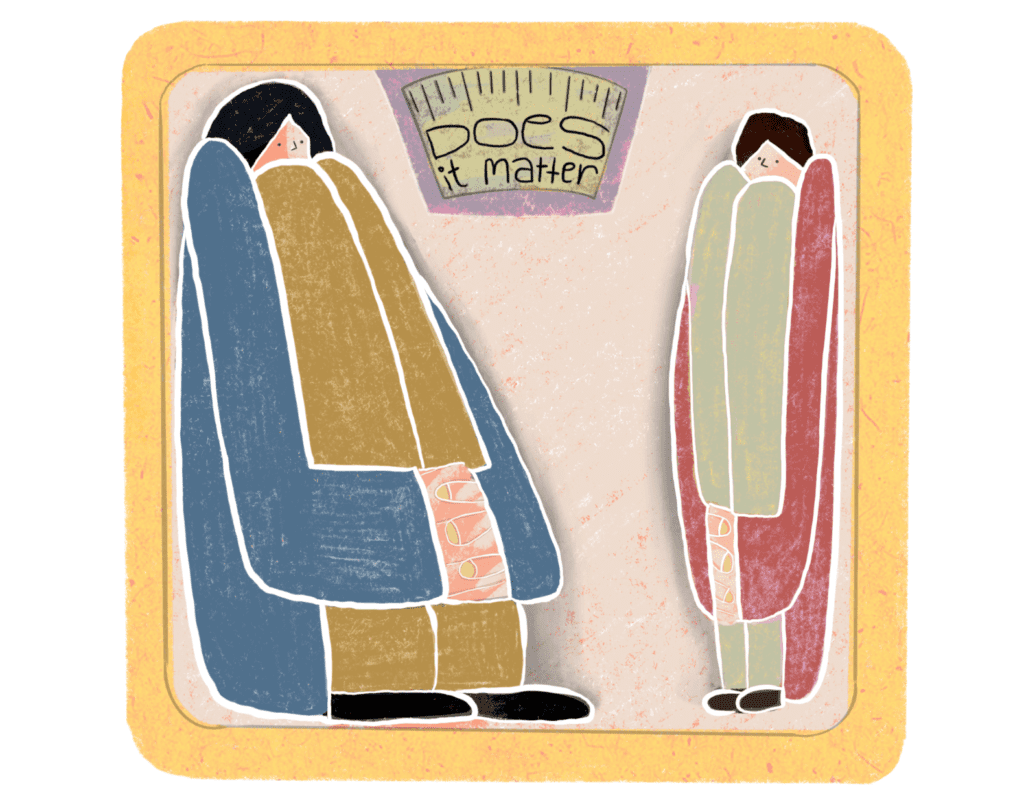
“I feel so guilty for eating so much of that cake.”
“That food looks so unhealthy”
“Health is the most important – why aren’t you working out more often?”
Or worse, “You’ve put on so much weight!”
Conversations about health are a part of our every day, from aunties at weddings, to when we grab brunch with friends, and even in our workplaces sometimes.
What makes these conversations so all-pervasive? And are they actually good for us?
Health and weight have become inextricably linked
When we say ‘unhealthy’ food do we mean food that’s not nutritious or food that is likely to make you put on weight?
It’s the latter of course. Because culturally ‘wellness’ has become a substitute for restrictive patterns of eating and exercising. Although people speak more about ‘health’ than size, they often mean the latter.
The bias is so deeply rooted in us that even healthcare providers have been found to judge plus-size people as ‘lazy’ ‘undisciplined’ and ‘bad’. Research indicates they’re extremely likely to recommend weight-loss to plus-size individuals seeking help for entirely unrelated concerns.
Even BMI, the supposedly ‘scientific’ measure of health has been found to be flawed. Even the very founder of BMI (who was in fact, not a medical professional) never intended for it to be used as a metric of health. He also made his calculations based on a sample of white European men. This leads to people from other races, genders, and ethnicities being arbitrarily categorised as ‘unhealthy’.
If medical professionals are susceptible to weight-stigma, how can we claim to be immune from it? Well, the numbers show that we aren’t. Statistics show plus-size people are discriminated against when it comes to relationships, housing, and even employment opportunities.
Health has nothing to do with size

Actually, it’s completely possible to be perfectly healthy as a plus-size person. There’s even a public health framework called ‘health at every size’ that affirms the diversity of bodies of all shapes and sizes without pathologizing or stigmatising any particular type of body. Plus size people have always existed across our history. The notion that plus-size people are inherently unhealthy and need to be advised to lose weight is also flawed. Studies showing that plus-size people have poorer health outcomes need to be examined more carefully. There are other factors involved that are influencing plus-size people’s health. Poorer health outcomes are likely due to the discrimination meted out to them in medical settings. Not only is medical equipment not designed for certain body types, but doctors are sometimes unaware of the dosages of medicine required for plus-size people, given that most testing is done on thinner bodies. Weight bias in the medical field leads to plus-size people being reluctant to seek healthcare support for other concerns.
Some research indicates that weight cycling or repeatedly losing and putting on weight, which many plus-size people are likely to do, given that most diets are ineffective in the long-term – is more unhealthy than being plus-size.
Research indicates that shaming and blaming people for their bodies leads to chronic stress and takes a psychological toll on them, which actually causes them to use eating as a coping mechanism. Weight stigma itself adversely affects the health of plus-size people leading to elevated blood pressure, eating disorders, and other mental health concerns.
The issue with focussing excessively on health in an individualistic way
Health is complicated and multi-faceted. No two bodies are the same or have the same nutritional requirements. Taking care of yourself can actually mean a lot more than working out and eating clean. If we look at health from a more holistic lens – it would also include mental health. On a bad mental health day instead of beating ourselves up for skipping a workout, it may be more helpful and motivating to be kinder to ourselves.
But health has become a ‘super value’ – deeming those engaging in health-seeking behaviours as morally superior, more hard-working, and simply just better than those who are not. People who are not engaging in health-seeking behaviours or appear to not be engaging in them are culturally demonised and dubbed ‘lazy’ and inadequate. This creates a kind of moral hierarchy where some people are judged as superior to others based on their ability to take care of their health.
The way we talk about health makes it seem like our health is entirely contingent on our own ‘hard work’ and ‘determination’ and ability to resist unhealthy foods. But health is not just our individual responsibility. Health insurance, access to certain kinds of food, time to exercise, poverty, trauma, and stress due to various forms of oppression can all exert a significant influence on our health.
Health is hence, a lot more contingent on privilege than it may seem. Conversations about health could involve looking at health in more systemic, holistic ways. What would become possible if we were more reflective of our own biases, and more importantly – if we were kinder to ourselves and others?

